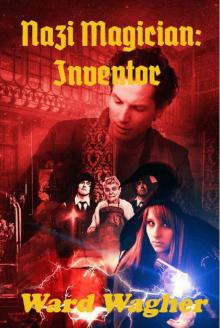- Home
- Ward Wagher
Nazi Magician: Inventor Page 2
Nazi Magician: Inventor Read online
Page 2
“You had a three-day weekend, Konrad,” Florian said. “Count your blessings.”
“Right. And what is going on here?” he asked. And he walked over to Dieter’s bench.
“Inconsistent results,” Florian stated.
Konrad groaned. Inconsistent results from an experiment were the bane of a scientist’s life. Any proper investigation produced results that were not only accurate but reproducible. He had worried about Dieter’s experiment. His work lacked the precision Konrad strove for in his lab work. And the results were never cut and dry.
“Konrad come over and run the experiment,” Ignatz ordered.
The big man shrugged and walked over to the apparatus. “So that I understand what you are doing. You engage the machine with the switch and then turn this knob to increase the power to it. Is that correct?”
“Yes, yes,” Ignatz said impatiently. “That is how we must do it.”
“Very well,” Konrad said.
He flipped the knife switch over to make contact and then studied the meters. He confirmed that power was feeding into the machine. He began carefully twisting the rheostat and watched the meters on the input side climb.
“You are nearing the threshold there,” Dieter commented.
“Right,” he replied.
He twisted the knob past the threshold, and nothing happened. He turned it to its maximum, and a faint glow came from the light.
“That is interesting,” Florian commented. “You are getting some reaction. When Ludwig gets in, we should let him try.”
“He called in sick this morning,” Ignatz said. “Dieter, I want you to continue your experiments. Try to explore the limits of the equipment. Carefully.”
“I understand,” Dieter replied.
Turning to Konrad, Ignatz issued more orders. “I want you to duplicate Dieter’s experiment and document the differences in the results.”
“What about me?” Florian asked.
“Help Dieter.”
“Right.”
Ignatz retreated to his office while Dieter turned back to his apparatus. A moment later, they heard a yelp from the office. Ignatz reappeared in the doorway, rubbing his behind.
“Florian!” he yelled. “Not funny.”
Florian grinned and turned back to his workbench. Though a quiet person, he was also the prankster in the lab.
“What did you do?” Dieter asked.
“I put a thumbtack on his chair.”
“One of these days, he will turn you over to the Gestapo,” Konrad stated.
“Naah,” Florian responded. “He loves me.”
“Okay, then, let’s do this the right way. We will start the device and record the readings every step of the way. First I will do it, then you. After that, we will try Konrad again. Then we compare the results.”
“Very well,” Florian replied. “We need to figure out what is going on here.”
“Deductively speaking, the devices seem to depend upon who happens to be operating it. It works for some of us and not for others.”
“And for some, just a little bit.”
Dieter rubbed his face as he stared at the equipment on the workbench. “We need a wider sample, then.”
“How would you suggest we do that?”
“We need to do a blind sampling. Maybe we can start with everybody in this building. We don’t show the test subjects the readouts or the equipment itself, just the switch and the rheostat. They can flip the switch on and turn the rheostat. Not only will we get a decent sampling of the general population, but if we need more people to help, we will know who to ask.”
“That’s a good idea, Dieter. Should we check with Ignatz?”
“Yes, we probably should. If he sees us parading people from the building through the lab, he will get his nose out of joint.”
“That wouldn’t be anything new,” Florian commented.
“Ha!”
“Okay, then, let’s work out a plan for making this happen. You get to write it up.”
Florian grimaced. “I knew this was getting to be too good to be true.”
“Get your notebook, and let’s get busy.”
“Right.”
CHAPTER THREE
October 20, 1939
At the end of a long week, Dieter was more frustrated than ever. Since the Luftwaffe controlled the building, they felt safe in bringing people from other floors to a small office down the hall from the lab. They instructed the subjects on how to manipulate the device, without explaining to them, of course, what they were doing. Of the forty people in the building, only four more caused the experiment to work. They discovered that each individual had to flip the knife switch as well as turn the rheostat for it to work.
They carefully researched the people who had succeeded and did not find any commonality. Yet, for three of the four, the apparatus worked as well as it did for Dieter. The fourth produced results similar to Konrad – a dim glow.
He shut down all the power connections and locked the office. He walked down the hallway and back to his lab and then into Ignatz’s office. He plopped down in the chair across from the desk with a deep sigh.
“Why so at loose ends, Dieter?” Ignatz asked.
“We have four people in the entire building who can make the apparatus work, besides those in our lab. And there is not any kind of explanation as to why that happens.”
“I believe what you have is a conundrum,” Ignatz said with a smile.
“You seem very relaxed this afternoon,” Dieter commented.
“So, we have a challenge, my friend. But look at what we have accomplished. You have created a machine that pulls power out of nothing. It is more than a perpetual motion machine. This is something that works. We may never discover why it works. But I would like you to build another machine, let’s call it a Mark 2. I will give you two objectives. I want you to use a dry cell to start the apparatus, and then it should be able to sustain itself by using part of the power it generates.”
Dieter rolled his tongue around in his cheek. “I think I can do that, Ignatz. I’m beginning to see some practical applications for this.”
“Right. Secondly, you need to work on the output side. It needs to both scale up and down. It could operate heavy machinery without the need for petroleum. It could power a U-boat without having to recharge batteries. Do you understand what I am asking?”
“Yes, I do. I’ll get right on it.”
“No,” Ignatz said with a laugh. “You will leave for the weekend. You have been driving yourself very hard. You need the rest.”
“Okay, Ignatz,” Dieter said. “I will see you Monday.”
Dieter trudged along the sidewalks of Frankfort, and it seemed to him the city was drearier than usual. The sullen gray sky and the wind-driven leaves were depressing. He had accomplished what Ignatz asked of him, but he wasn’t sure he truly understood what he was doing. Why the stupid experiment only worked for a few people, but not for most everyone else, was a baffling mystery.
He approached his apartment house and saw a large Hausfrau ahead of him. She turned up the sidewalk to the house containing his apartment. He hadn’t noticed her before and wondered if she was a new move-in. Hearing a siren, he turned and watched as a Gestapo car roared past. Probably in a hurry to harass some poor Jew, he thought. When he turned back, the old woman had entered the house, and the door closed behind her.
He walked into the house and mounted the stairs to get to his third-floor alcove. It was a single room flat in the turret at one corner of the old house. It had windows on three sides, which afforded a marvelous view, but also gave scant privacy. He rather liked the room, although he did not like having to trudge down to the second floor to use the toilet. And in the mornings, people were lined up to visit the adjacent bathroom for their bath or shower.
At least the landlord provided breakfast and an evening meal for those who returned in time for it. The tenants were on their own for lunch. The aroma coming from the first-floo
r kitchen indicated dinner was soon. He walked up to the third floor to leave his jacket in his room and returned to the dining room in time to get a good chair at the table, and the first shot at the stew pot.
He left his room and descended the stairs. He was walking along the narrow hallway when a door jerked open in front of him. He halted as the old lady stepped out. She seemed much larger than he had initially thought. And she fastened a frightening glare upon him.
“You must be cautious, young man, so that I do not run you over,” the old woman said. “You would be a grease spot on the floor.”
“I am sorry,” Dieter said. “You surprised me.”
“No matter. I suppose you will want to get to the dining room.”
“No, go ahead,” he replied.
“Very well.”
She stopped at the head of the stairs. “And what is your name, young man?”
“I am Dieter Faust.”
She nodded. “You may call me Frau Hohltaube.”
And she turned and marched down the steps, the stairs creaking as she made her way down. Dieter concluded that she must be a substantial woman. He gingerly followed her down the stairs wondering if they would give way. Fortunately, they seemed to be stoutly constructed.
They were the first to arrive in the dining room. The old woman turned to him.
“You very likely have a favorite seat at the table, Herr Faust. I will wait for you to sit down.”
He looked at her while his natural politeness battled his growing hunger. Finally, he pulled out a chair and sat down. She pulled out a chair and sat next to him. It made him uncomfortable as the other arrivals would often leave a chair between each other, until there was no choice but to fill in. There were currently six other renters in the house.
He glanced over at Frau Hohltaube, who glared back at him. He thought she might have winked slightly at him, but wasn’t sure. This old woman intimidated him worse than the Gestapo agents.
“What do you do for a living, Herr Faust?” she asked.
“I work for the Bailor Electrical Laboratory.”
She nodded knowingly. “You are a scientist, then.”
He frantically tried to remember what Ignatz had instructed him about security. She had somehow managed to read him accurately. He wondered if she realized how she had rattled him.
“Um… I do not believe I can talk about what I do at the laboratory.”
“Then I owe you an apology,” she said with a small smile. “I should not be grossnasig.”
“Macht nichts,” or no matter, he said. “It is no great secret I work there. But I really should not talk about it. What do you do, Frau Hohltaube?”
“I cook or clean houses for a living,” she said. “I enjoy helping people.”
“Did you just move in? I haven’t seen you here before.”
She nodded. “The SS took over my other house to use as office space. I had no choice but to move.”
“That is unfortunate,” he commented.
“It is what it is, I suppose. However, this is a chance to meet new people.”
A middle-aged woman entered the room and selected a chair across from Dieter.
“Good evening, Dieter,” she said in a soft voice as she stood behind her chair.
He nodded. “And good evening, Fräulein Bundchen.”
Fräulein Bundchen eased the chair out and sat down. Dieter had idly wondered how old the woman was. Her face was lined, and her mousy brown hair had streaks of gray. But she had the voice of someone much younger.
Another renter, Wolfgang Pielke, marched in. He wore an SS lieutenant’s uniform. Fraulein Bundchen glanced over with distaste as he sat next to her. Dieter had decided Wolfgang was not a bad fellow. And one did what one must to survive. At least now with the war, there were plenty of jobs for those who hadn’t been drafted into the Wehrmacht.
Two more renters drifted in and selected chairs. Dieter had never learned the names of these men. Most seemed to want to mind their own business. The most extended conversation he had with any of them was with Frau Hohltaube, just a few moments earlier.
Herr and Frau Becker walked into the dining room carrying a turine of soup and a platter of roasted pork loin.
“The potatoes and beans will be coming in a minute,” Frau Becker announced.
Dieter considered the table set before him. For what the Beckers charged for rent, which wasn’t much, they sure fed them well.
“This looks very good,” Frau Hohltaube said.
“The food is usually very good,” he replied.
The others around the table stared at him but said nothing. Of course, he said little to them as well. Perhaps it was just as well. He wondered how many of the others had secret occupations.
The food was indeed excellent and plentiful. Following a very satisfying dinner, Dieter rose to return to his room. Frau Hohltaube followed him up the stairs.
“You have a very good night, Dieter,” she said as she stopped at her door.
“Thank you, Frau Hohltaube. You too.”
Dieter turned on the lamp and pulled out a book on electrical theory that he had found in a used bookstore. It hadn’t cost him much. He wondered if it was because the previous owner’s name was inscribed inside the cover, and the name looked Jewish. Whatever. He had earned a degree in electrical engineering from the university in Frankfort but had always felt a hunger to know more.
This book was technically challenging and was difficult enough to keep him occupied. He had several friends who pressed him to visit the beer cellars during the evenings and weekends. That usually required more money than he was willing to spend. Although he was well paid for his age, he preferred to spend his money on things that helped him to learn. And considering the challenges facing him in the lab, he had a lot to learn.
As he plowed through a chapter, he found his eyes growing heavy. Twice he dropped the book in his lap as he dozed off. After turning off the light, Dieter slipped out of his clothes and under the covers. Since the building was not well heated, he slept well in the cool room. He awakened with vaguely remembered dreams about devices that worked for no reason and his encounters with the ferocious old woman.
CHAPTER FOUR
October 23, 1939
The Beckers usually set out a basket of Brötchen, or small, round, bread rolls for the commuters to grab on their way out the door in the mornings. Dieter often skipped breakfast to get to the lab early. Many delicatessens and coffee counters opened early for the breakfast traffic, but Dieter preferred to sate his hunger with the bread. It didn’t cost him anything, and it usually held him until lunch.
The morning was crisp and clear as he walked along the lighted streets. The early traffic consisted of cars, trucks, and horse-drawn wagons, but it was sparse. Dieter munched on a Brötchen as he walked. He had stuffed two more in his coat pocket, planning to eat them during the morning. He was already laying out the day’s tasks in his mind and had given a lot of thought to Ignatz’s directive to build a more advanced apparatus. He also continued to ponder the mystery of why the equipment would work for some people and not for others.
He briefly considered whether there was some kind of magical effect involved, and immediately dismissed it as irrational. He was a scientist and an engineer. The Gypsies claimed to practice magic, but he was convinced that was merely a sleight of hand used to trick unsuspecting rubes out of their money. No, there had to be an explanation for the effects they observed, and he was confident he would eventually find it.
As he walked past an open alley, a whimper came out in the darkness. He stopped to listen, not sure of what he had heard. The sound came again, and he stepped down the alley, thinking that perhaps a dog had been injured. He hated to see an animal suffer.
The gray darkness gradually resolved to where he could see two men standing, and it looked like a third was kneeling. The whimper turned into a cry, a female cry.
“What are you doing?” he shouted.
The two men
turned around and flashed Gestapo disks, and one of them snarled, “This is no business of yours.”
The man on his knees grunted, and the woman cried again.
“What you are doing is wrong!” Dieter exclaimed.
“It’s just a Jew girl. Go on your way before we arrest you.”
Dieter hesitated. These Gestapo agents were abusing their position to commit rape. Yet, they could make him disappear in an instant if he continued to protest.
“I think your entertainment is complete, Leute.” Dieter and the men looked up quickly at the voice coming out of the darkness.
One of the Gestapo agents scowled. “It is turning into a bus station here!”
Frau Hohltaube stepped out of the deep shadows to where they could see her. “You! Get away from the girl.”
The man on his knees quickly stood up and buttoned his trousers.
The third man spoke. “I think we need to run all of these Untermenschen to the station. What they are doing is unseemly.”
The old lady was suddenly standing directly in front of the third man. Yet Dieter had not even seen her move. But it could have been the shadows playing tricks on his eyes. The third Gestapo agent seemed to wilt under Frau Hohltaube’s glare.
“You three will leave and forget you were ever here,” she said.
Dieter thought he heard the rumble of thunder, but the weather was clear, and there were no thunderstorms in October. He decided it must be the rumble of the railroad. The three Gestapo agents turned and quickly walked out of the alley.
“What do we do now?” Dieter asked.
“You need to go to work, Herr Faust,” she said directly. “I will take care of the girl. Now, go. You do not want to be late.”
“Very well, Frau Hohltaube,” he replied. “I will speak to you this evening.”
The old woman was already bending over the girl lying in the dirt and the cobblestones, as Dieter turned away. He wasn’t sure what it was about the old woman that was so frightening, but it solved the immediate problem. He walked quickly to the end of the alley and resumed his route along the sidewalk.

 The Mountains of Montora (The Chronicles of Montora Book 1)
The Mountains of Montora (The Chronicles of Montora Book 1) Nazi Magician: Inventor
Nazi Magician: Inventor The Last Paladin
The Last Paladin Inconsequential Nazi
Inconsequential Nazi Impossible Nazi
Impossible Nazi The Snows of Montora (The Chronicles of Montora Book 3)
The Snows of Montora (The Chronicles of Montora Book 3) The Margrave of Montora (The Chronicles of Montora Book 2)
The Margrave of Montora (The Chronicles of Montora Book 2) Gravity Rising (The Parallel Multiverse Book 2)
Gravity Rising (The Parallel Multiverse Book 2) ruBracks, Nazis, the Death of the Universe & Everything (The Parallel-Multiverse Book 1)
ruBracks, Nazis, the Death of the Universe & Everything (The Parallel-Multiverse Book 1) Improbable Nazi (Parallel Nazi Book 2)
Improbable Nazi (Parallel Nazi Book 2) Accidental Nazi
Accidental Nazi Improbable Nazi
Improbable Nazi